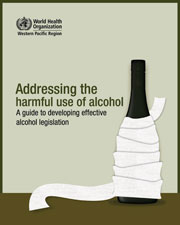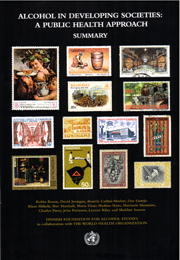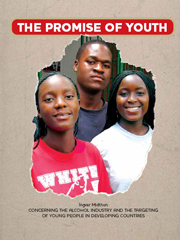
Home > Intergovernmental institutions > World Bank > World Bank report on youth raise alcohol issue
In the chapter "Growing up healthy" major risk factors are identified and the emphasis is put on unprotected sex, tobacco use, drug use, excessive alcohol consumption, physical inactivity, and unhealthy diet. These risky behaviours can have great impact on present and future health care expenditures.
Says the report: "Governments around the world try to reduce risky behavior—through tobacco control; regulation of alcohol consumption; and public messages about diet, nutrition, and safe sex. Such public intervention is justified because of market failures that dominate health behavior and cause individuals to make privately and socially inferior health decisions, and these market failures are magnified for young people. Private markets do not facilitate optimal decision making by individuals for a number of reasons."
The report point out that risky health behavior during youth can deplete the economy of productive human capital for many years into the future.
In the section on enhancing opportunities to make healthy choices it is pointed out that having better access to health services can encourage young people to practice safe behavior. Conversely, restricting opportunities to make poor choices may also be beneficial. The set of available opportunities can be altered by changing their availability directly, or by changing prices. For tobacco use and alcohol consumption, taxes, advertising bans, and sales restrictions can reduce demand: "In addition to raising prices through taxation, comprehensive bans on advertising and product promotions, age restrictions on sales, and prominent health warning labels can reduce the consumption of tobacco and alcohol."
To read or read about the report, visit the World Development Report 2007 web page.

World Bank report on youth raise alcohol issue
The recently published World Development Report 2007 - Development and the Next Generation is all about the importance of young people in the development issue. Alcohol is among the risky health behaviours that influence their lives.
2006-09-29
In the foreword The World Bank Group President, Paul Wolfowitz, points out the five pivotal phases of life that can help unleash the development of young people’s potential with the right government policies: learning, working, staying healthy, forming families, and exercising citizenship. He states that within each of these transitions, governments need not only to increase investments directly but also to cultivate an environment for young people and their families to invest in themselves.
In the chapter "Growing up healthy" major risk factors are identified and the emphasis is put on unprotected sex, tobacco use, drug use, excessive alcohol consumption, physical inactivity, and unhealthy diet. These risky behaviours can have great impact on present and future health care expenditures.
Says the report: "Governments around the world try to reduce risky behavior—through tobacco control; regulation of alcohol consumption; and public messages about diet, nutrition, and safe sex. Such public intervention is justified because of market failures that dominate health behavior and cause individuals to make privately and socially inferior health decisions, and these market failures are magnified for young people. Private markets do not facilitate optimal decision making by individuals for a number of reasons."
The report point out that risky health behavior during youth can deplete the economy of productive human capital for many years into the future.
Alcohol, tobacco and drugs
In the section on alcohol, tobacco and drugs the report points out:
- Alcohol is the most widely consumed drug in the world: about half those 15 and older have consumed alcohol in the past year.
- Limited data from developing countries suggest that young people are beginning to drink alcohol at earlier ages. Boys are more likely than girls to drink alcohol, and to drink heavily, though consumption among girls in some countries (especially in Latin America) has begun to approach or even surpass that of young men.
- Early initiation of alcohol use is correlated with a greater likelihood of both alcohol dependence and alcohol-related injury.
- Young people who abuse alcohol and drugs are more likely to commit crimes, and substance abuse is a major risk factor in violence.
While governments intervene in these areas in many ways, these measures must be better designed to address the unique market failures young people face when making choices about their behavior.
In the section on enhancing opportunities to make healthy choices it is pointed out that having better access to health services can encourage young people to practice safe behavior. Conversely, restricting opportunities to make poor choices may also be beneficial. The set of available opportunities can be altered by changing their availability directly, or by changing prices. For tobacco use and alcohol consumption, taxes, advertising bans, and sales restrictions can reduce demand: "In addition to raising prices through taxation, comprehensive bans on advertising and product promotions, age restrictions on sales, and prominent health warning labels can reduce the consumption of tobacco and alcohol."
To read or read about the report, visit the World Development Report 2007 web page.
![]()
![]()
Developed with CustomPublish CMS by Nettinfo AS




